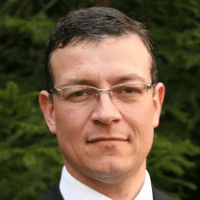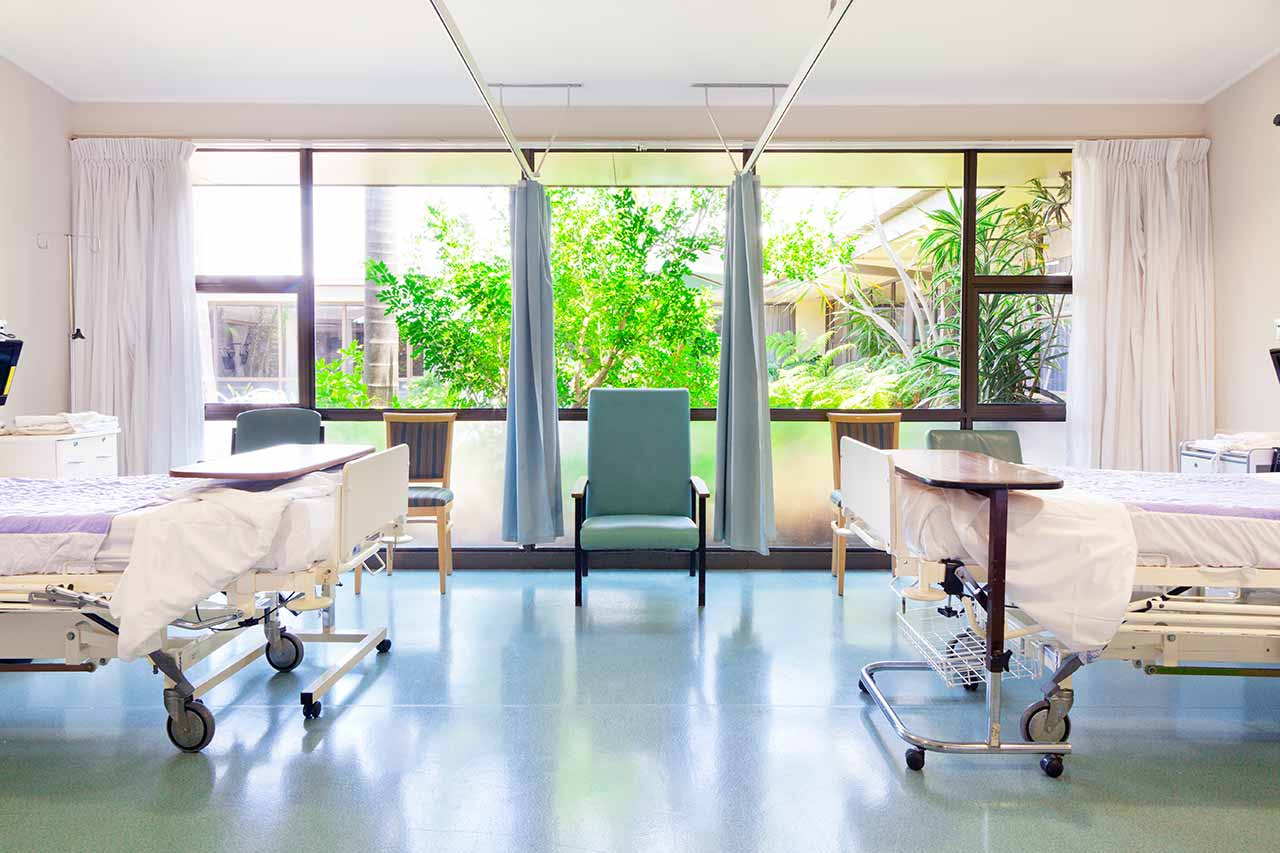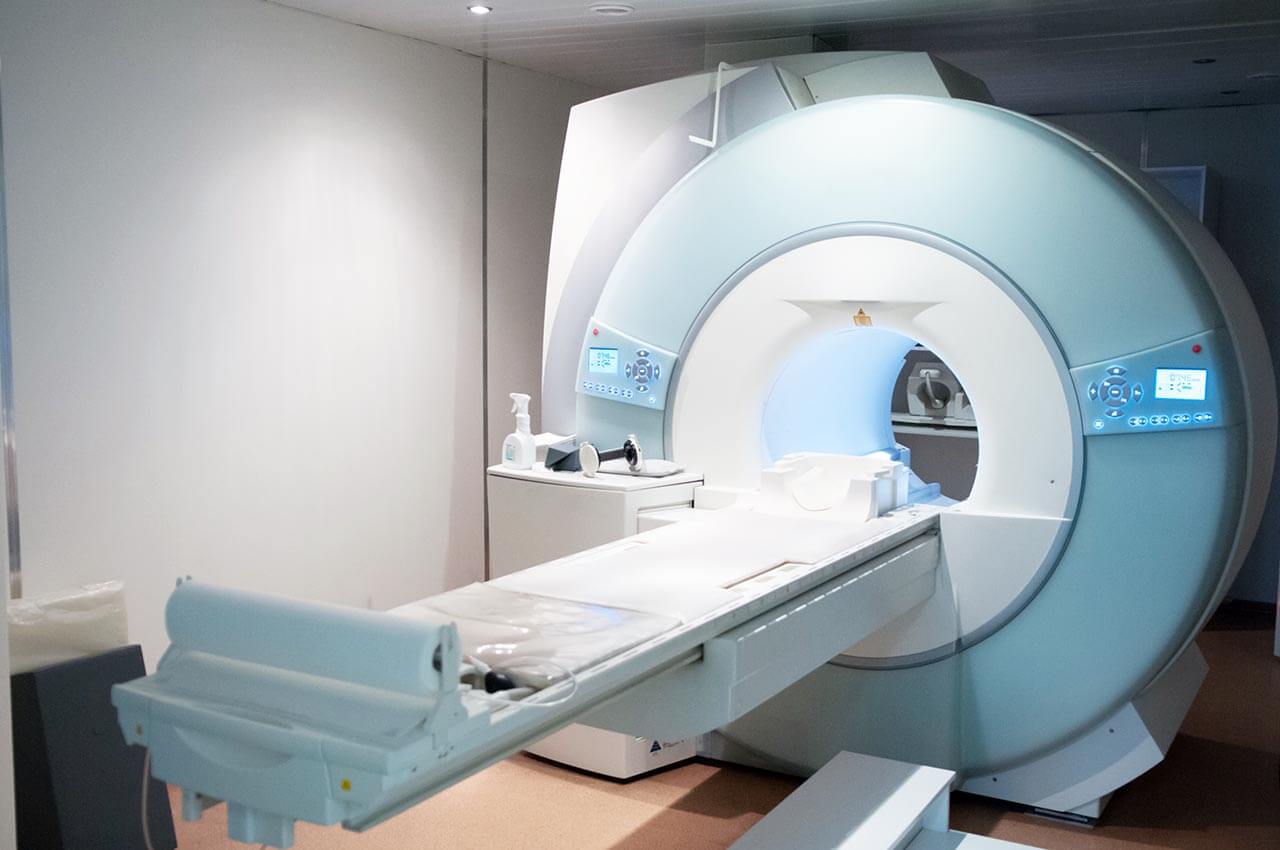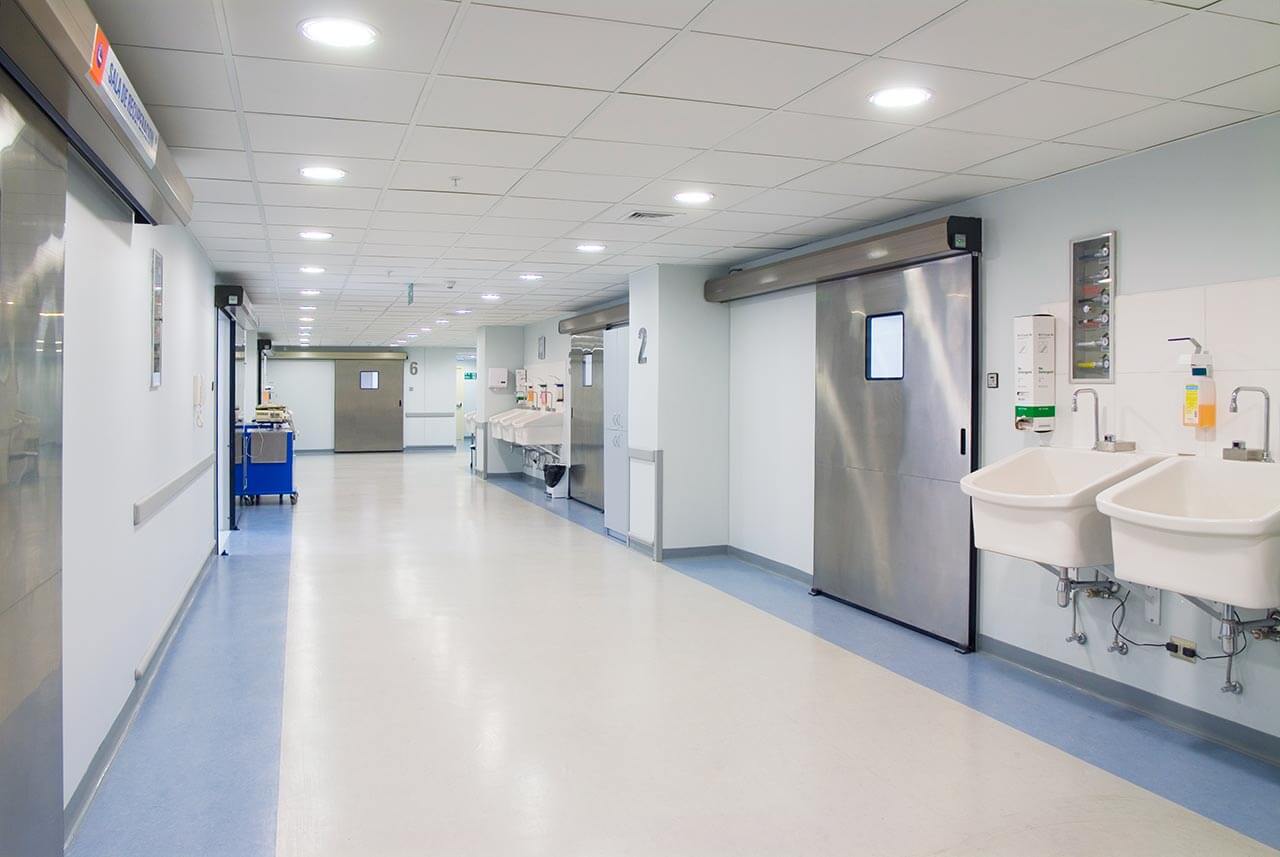
The program includes:
- Initial presentation in the clinic
- clinical history taking
- review of medical records
- physical examination
- laboratory tests:
- complete blood count
- biochemical analysis of blood
- inflammation indicators
- indicators blood coagulation
- microacterial inoculation of secretion
- histological tissues examination
- x-ray chest examination
- lung function analysis
- allergy status
- chest CT/ MRI
- bronchoscopy of indications
- consultation of related specialists
- symptomatic specific treatment
- the cost of essential medicines and materials
- nursing services
- control examinations
- full hospital accommodation
- developing of further guidance
Required documents
- Medical records
- Spirometry (if available)
- Chest X-ray (if available)
Service
You may also book:
 BookingHealth Price from:
BookingHealth Price from:
About the department
The Department of Pulmonology and Infectology at the University Hospital Saarland Homburg provides all modern diagnostic and therapeutic options for patients with respiratory diseases. Of particular interest is the treatment of lung cancer (in collaboration with cardiothoracic surgeons and oncologists), respiratory failure, chronic obstructive pulmonary disease, and pneumonia. The department offers the services of specialized sections for coronavirus infection, cystic fibrosis, alpha-1 antitrypsin deficiency, interstitial lung disease, and pulmonary hypertension. The department's patients can also receive highly effective intensive care, including extracorporeal membrane oxygenation (ECMO), MARS therapy, and long-term venovenous hemodialysis. The department has the necessary resources for endoscopic diagnostics and treatment, as well as pulmonary function tests in a specialized laboratory. With 78 beds, the department is one of the largest medical facilities of this kind in Germany, including 18 beds with mechanical ventilation. The therapeutic options of the medical facility are complemented by the treatment of infectious diseases, including tropical infections. The department is headed by Prof. Dr. med. Robert Bals.
Lung cancer is one of the most common types of cancer and has a high mortality rate. Lung cancer treatment is a priority for doctors at the medical facility. A modern, specialized Lung Cancer Center, which is part of the department, was founded at the University Hospital in 2017. At this center, pulmonologists, cardiothoracic surgeons, oncologists, radiation therapists, and specialists providing palliative care and psychological support collaborate. Each clinical case is considered at regular interdisciplinary tumor boards, during which doctors study the patient's clinical data and determine which treatment methods will be most effective in his case. In most cases, the treatment is based on the surgical resection of the tumor, a lung lobe, or the whole lung. Chemotherapy and/or radiation therapy are almost always carried out as well. The Lung Cancer Center is certified according to the standards of the German Cancer Society (DKG), which indicates the highest quality of treatment in compliance with current clinical protocols.
The department is one of the few in Germany where patients with rare respiratory pathologies are treated. The department's pulmonologists are rightly proud of their high success rates in the treatment of cystic fibrosis, pulmonary hypertension, idiopathic interstitial pneumonia, interstitial lung disease, alpha-1 antitrypsin deficiency, bronchiectasis, and other pathologies. The above-mentioned diseases are treated using individually developed drug therapy regimens, inhalation therapy, physiotherapy procedures, and other therapeutic methods.
Particular importance in the department is given to endoscopic diagnostic and treatment methods. The specialists at the medical facility have state-of-the-art equipment for endoscopic examinations, which are of particular value for assessing the condition of the respiratory system. Flexible and rigid bronchoscopy, transbronchial lung biopsy, lung cryobiopsy, and endobronchial ultrasound examinations are available here. Endoscopic techniques are also widely used for therapeutic purposes. For example, endobronchial cryotherapy is performed to destroy small lung neoplasms, eliminate respiratory failure due to tumor stenoses in the trachea and bronchi, or remove foreign bodies from the bronchi. The department's doctors also perform electrocoagulation to stop internal bleeding, and endoscopic lung volume reduction is often prescribed for chronic obstructive pulmonary disease, etc.
The department's range of services is complemented by the diagnostics and treatment of sleep-related breathing disorders. For this purpose, the department has a state-of-the-art sleep laboratory, which allows doctors to carry out sleep screening on an outpatient basis. During the examination, doctors can detect sleep apnea, snoring, and other breathing problems during sleep. These examinations can be carried out at home using the Apnoescreen system. After comprehensive diagnostics, patients are prescribed the optimal treatment to get rid of sleep-related problems and improve their quality of life.
The department specializes in the diagnostics and treatment of the following diseases:
- Lung cancer
- Pulmonary fibrosis
- Tuberculosis
- Pneumonia
- Rare lung diseases
- Idiopathic interstitial pneumonia
- Interstitial lung disease: pulmonary langerhans cell granulomatosis, pulmonary sarcoidosis, and pulmonary alveolar proteinosis
- Exogenous allergic alveolitis
- Alpha-1 antitrypsin deficiency
- Bronchiectasis caused by immunoglobulin deficiency
- Bronchial asthma
- Chronic obstructive pulmonary disease
- Sleep-related breathing disorders
- Infectious diseases, including coronavirus infection, tropical infections, and other diseases of this spectrum
- Other pathologies
The department's main clinical activities are as follows:
- Diagnostics
- Pulmonary function tests
- Body plethysmography
- Lung diffusion capacity measurement
- Blood gas analysis
- Fractional exhaled nitric oxide (FeNO) test
- Measurement of respiratory muscle strength
- Spiroergometry
- 6-minute walk test
- Ultrasound scans
- X-ray scans
- Endoscopic examinations
- Endobronchial ultrasound
- Transbronchial lung biopsy and transbronchial cryobiopsy
- Pulmonary function tests
- Treatment
- Drug therapy: intake of pills, injections, and infusions
- Inhalation therapy
- Oxygen therapy
- Physiotherapy procedures
- CPAP and BiPAP therapy for sleep-related disorders
- Intensive care for pulmonary diseases: invasive and non-invasive ventilation, ECMO, MARS therapy, etc.
- Endoscopic procedures
- Endobronchial cryotherapy for the destruction of small lung neoplasms, the elimination of respiratory failure due to tumor stenoses in the trachea and bronchi, or the removal of foreign bodies from the bronchi
- Electrocoagulation for internal bleeding
- Endoscopic lung volume reduction for chronic obstructive pulmonary disease
- Bronchoalveolar lavage
- Medical care for patients after lung transplant surgery
- Other diagnostic and therapeutic services
Curriculum vitae
Higher Education and Professional Career
- 1987 - 1994 Medical studies, Ludwig Maximilian University of Munich.
- 1994 - 1996 Intern, Assistant Physician, University Hospital of Ludwig Maximilian University of Munich.
- 1996 - 1999 Postdoctoral Fellowship, University of Pennsylvania, Institute for Human Gene Therapy, Philadelphia, USA.
- 1999 - 2001 Assistant Physician, University Hospital of Ludwig Maximilian University of Munich.
- 2001 - 2010 Assistant Physician and Senior Physician, University Hospital Marburg.
- Since 2010 Head of the Department of Department of Pulmonology and Infectology at the University Hospital Saarland Homburg.
Memberships in Professional Societies
- Cystic Fibrosis Society.
- European Respiratory Society (ERS).
- American Thoracic Society.
- German Society of Immunology.
- German Society of Infectious Diseases.
- Association of German Therapists.
- German Society of Pulmonology and Respiratory Medicine.
Photo of the doctor: (c) Universitätsklinikum des Saarlandes
About hospital
The University Hospital Saarland Homburg is the largest hospital in the city of Homburg and the most important medical facility in the region. The hospital, which currently has 30 specialized departments and 20 institutes, was founded in 1947 and operates on the basis of Saarland University. The hospital plays a leading role in medical education, research, and medical care both in the state of Saarland and throughout Germany. With vast experience in serving foreign patients, the medical facility is also widely known in the international medical arena.
The pride of the hospital is state-of-the-art equipment that allows the doctors to perform high-precision comprehensive diagnostics and the most sparing treatment even if a patient has a severe pathology. Patients are offered innovative medicine based on the very latest scientific achievements. At the same time, the hospital offers many therapeutic methods that are used only in leading medical centers in Europe, including da Vinci robot-assisted surgery, CAR T-cell therapy, TAVI and MitraClip catheter-based procedures, innovative laser procedures, etc. Great importance is paid to ethical and social competence. The hospital is constantly improving the work of its medical personnel and infrastructure to provide medical services that meet the highest standards.
As a multidisciplinary medical complex, the hospital offers highly effective treatment of the full range of common diseases as well as rare and severe pathologies. The efforts of the medical staff, which includes over 600 doctors and 2,000 nurses, are focused on the patient and their unique needs and desires. The doctors always devote enough time to personal communication with their patients, provide them with moral support, and are sympathetic to every life situation.
Photo: (с) depositphotos
Accommodation in hospital
Patients rooms
The patients of the University Hospital Saarland Homburg live in comfortable single, double, and triple patient rooms with a modern design. Each room is equipped with an ensuite bathroom with a shower and a toilet, as well as everything else necessary: a comfortable bed, a bedside table, a TV, and a telephone. In addition, enhanced-comfort rooms and specially equipped rooms for people with disabilities are available for the patients.
Meals and Menus
The hospital offers healthy and delicious meals three times a day: buffet breakfast, dinner with a wide choice of dishes for every taste, and a light supper. The menu features dietary and vegetarian dishes. There is also a cafeteria on the territory where one can taste delicious dishes and have a cup of coffee, tea, or some refreshing drinks
Further details
The standard patient rooms include:
Religion
The hospital regularly hosts catholic and evangelical devine services. The services of representatives of other religions are available upon request.
Accompanying person
During an inpatient program, an accompanying person can stay with you in the patient room or in a hotel of your choice.
Hotel
During an outpatient program, you can stay in a hotel of your choice. The managers will help you choose the most suitable options.





